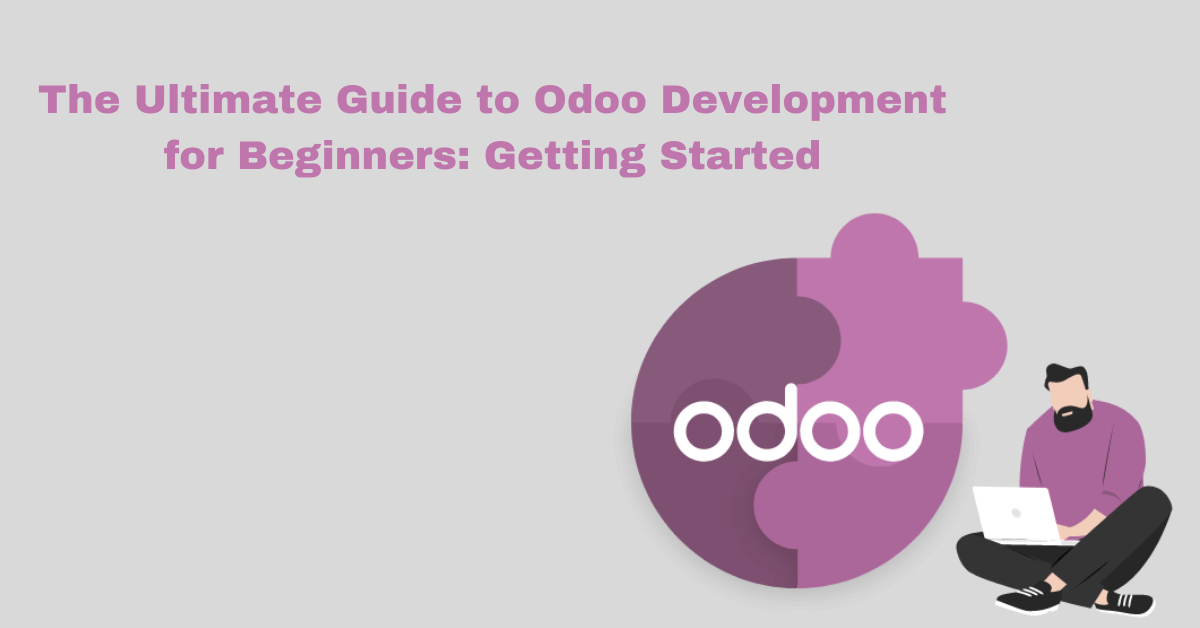Ultimate Guide to Odoo Development for Beginners: Getting Started
 Dilip Kumar
Dilip Kumar
Odoo, an open-source organisation aid making plans (ERP) and purchaser relationship control (CRM) platform, has steadily gained traction because of its modularity, flexibility, and fee-effectiveness. But in case you're thinking about harnessing its full capability to create custom programs, delving into the framework is crucial. In this blog, we'll provide a complete evaluate of the Odoo improvement framework, empowering you to make informed choices about customizations and improvement partnerships.
Key Components of the Odoo Development Framework:
Model-View-Controller (MVC) Architecture:
The MVC architecture lies at the heart of Odoo's modularity and maintainability. Let's explore each thing:
Models: These are the blueprints for your information, defining its structure, relationships, and commercial enterprise common sense. Think of them as digital representations of actual-international entities like clients, products, or invoices. Python code within models handles records manipulation and validation.
Views: Views translate data from fashions into a user-friendly visible layout. XML templates define the format and presentation of information, the use of widgets like forms, tables, and charts. You have the flexibility to create custom views for extraordinary interfaces and consumer roles.
Controllers: The controllers act as the mind, coping with user interactions and statistics float among models and perspectives. They listen for events like button clicks or form submissions, fetch statistics from models, and update views thus. Python code inside controllers implements the utility's common sense.
XML:
XML performs a flexible function in Odoo development:
View Templates: As stated before, XML templates outline the shape and factors of consumer interfaces. You can make use of numerous tags to create forms, tables, lists, buttons, and more.
Workflows: XML permits you to define custom workflows for business tactics. You can specify triggers, movements, and conditions to automate obligations and implement enterprise guidelines.
Security Rules: XML documents are used to configure get admission to manipulate and outline which customers can view, edit, or create precise records within the device. This ensures a stable and controlled surroundings.
Data Structures: XML files also can be used to outline custom information structures for storing non-widespread facts along present fashions.
Python:
Python serves because the core language for writing business common sense and increasing Odoo capability:
Model Logic: Within fashions, Python code dictates how facts is processed, confirmed, and interacts with different fashions. You can put in force custom calculations, statistics adjustments, and validation guidelines.
Custom Business Logic: For functionalities now not protected by trendy modules, Python lets in you to create custom modules with precise features and workflows. This ought to involve integrating with outside systems, automating duties, or imposing specific business regulations.
Controller Logic: As described in advance, Python code inside controllers handles consumer interactions, information waft, and application good judgment inside the MVC structure.
JavaScript:
While Python handles the backend logic, JavaScript powers the front-stop improvements and interactions:
Dynamic Form Behavior: Enhance consumer enjoy with dynamic form factors that replace or validate in real-time based on user input.
Custom Widgets: Create bespoke widgets for specific facts representations or interactions that cross past standard Odoo additives.
Real-Time Updates: Implement real-time data updates in dashboards and views with out full page reloads, the use of libraries like websockets.
Understanding Module Architecture:
Odoo's modularity is a middle strength. Applications are built as modules, self-contained units that amplify or modify the base machine with out affecting core functionality. Modules have a particular structure comprising fashions, views, controllers, and Python code, enabling impartial development and checking out.
Key Concepts and Considerations:
Inheritance: Leverage inheritance to extend existing modules and upload custom capabilities without enhancing center code, ensuring compatibility and destiny updates.
Hooks: Hooks are predefined factors within the framework wherein you can inject custom code to modify module conduct. This offers a non-invasive way to combine custom capability.
Security: Security is paramount in ERP systems. Odoo enforces get admission to control the use of companies, roles, and permission policies. Ensure you very well apprehend Odoo's safety mechanisms and put into effect quality practices.
Customization vs. Core Modification: Prioritize extending trendy modules via inheritance and hooks over without delay modifying middle code. Core changes can prevent upgrades and introduce compatibility troubles.
Benefits of Custom Development with Odoo:
1. Tailored Solutions for Unique Processes:
Precise Matching: Forget ordinary off-the-shelf software program that forces you to adapt your processes. Odoo custom development lets you create applications that reflect your actual workflows, putting off unnecessary steps and inefficiencies. This translates to:
Improved person enjoy: Intuitive interfaces designed for your particular necessities make regular obligations less complicated and quicker.
Enhanced productivity: Streamlined processes cast off workarounds and delays, boosting worker output and satisfaction.
Reduced mistakes: Customized mistakes coping with and validation reduce accidental information access and processing mistakes.
2. Unprecedented Integration Capabilities:
Connecting Disparate Systems: Seamlessly integrate Odoo along with your existing software program ecosystem, be it accounting equipment, stock management structures, or legacy databases. This gets rid of information silos, ensuring real-time statistics float and steady statistics.
Automated Data Exchange: Automate guide statistics switch and synchronization between Odoo and external systems, releasing up precious time and stopping human error.
Improved Collaboration: Connect internal groups and outside companions with a consolidated platform, fostering green communication and shared insights.
3. Future-Proof Scalability and Flexibility:
Adapting to Growth: As your enterprise evolves, your custom Odoo programs can evolve with you. Easily upload new functions, modules, or integrations to deal with changing desires and capture new possibilities.
Modular Maintenance: The modular nature of Odoo lets you replace or update person additives with out affecting the whole system, ensuring agility and decreased downtime.
Technology Independence: Odoo's open-supply structure frees you from dealer lock-in, allowing you to conform to technological improvements with out luxurious vendor migrations.
4. Open-Source Savings and Control:
Reduced Licensing Costs: Compared to proprietary ERP solutions, Odoo's open-supply model can notably lessen upfront licensing charges.
Transparent Code Base: Accessing and expertise the underlying code empowers you to customize, troubleshoot, and increase the platform as wanted.
Community Support: Benefit from a big and active Odoo community that gives sources, information sharing, and aid, lowering development fees.
5. Enhanced Visibility and Data-Driven Decisions:
Custom Reporting and Dashboards: Generate tailored reviews and dashboards that gift key metrics and insights applicable on your unique operations.
Improved Monitoring and Analysis: Track overall performance indicators in actual-time, allowing proactive decision-making and hassle-fixing.
Data-Driven Optimization: Gain deeper insights into your business strategies and discover areas for improvement, leading to better aid allocation and improved profitability.
When to Hire an Odoo Developer:
While Odoo offers a user-friendly interface and improvement surroundings, constructing complicated custom applications or integrations regularly requires specialized know-how. Consider hiring an experienced Odoo developer in case you stumble upon:
Complex Business Processes: For tricky workflows, facts models, or integrations, a developer can make certain most beneficial overall performance and protection.
Time Constraints: If in-residence resources are restrained or your task has a decent cut-off date, a developer can expedite development.
Ongoing Maintenance and Support: For long-time period device upkeep and future upgrades, having a improvement partner can provide helpful help.
Conclusion:
Odoo's development framework gives a strong platform for building effective custom programs. By understanding its middle components, concepts, and excellent practices, you can make knowledgeable decisions about your improvement technique. For complex initiatives or whilst knowledge is constrained, hiring Odoo developer can optimize your application's capability, safety, and lengthy-term maintainability.
Ready to free up the total ability of Odoo on your business? Hire Odoo developer today and embark on a adventure of seamless customization and streamlined operations.
Subscribe to my newsletter
Read articles from Dilip Kumar directly inside your inbox. Subscribe to the newsletter, and don't miss out.
Written by

Dilip Kumar
Dilip Kumar
Dilip Kumar, a seasoned tech blogger with over a decade of industry expertise, offers valuable insights into cutting-edge trends, technologies, and innovations.